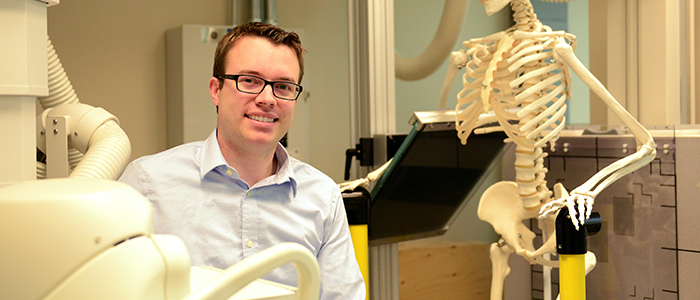Young scientist receives provincial research honour

With a passion for technical challenges and an interest in biomechanics and the musculoskeletal system, Matthew Teeter, PhD, was encouraged by his peers to consider Schulich Medicine & Dentistry as the place to complete his graduate studies.
Having just completed his undergraduate degree, Teeter moved from Guelph to London, beginning his master’s degree in 2008 under the supervision of David Holdsworth, PhD.
Fast forward to seven years later, and Teeter is now an assistant professor in the Departments of Medical Biophysics and Surgery at Schulich Medicine & Dentistry.
“Throughout my graduate studies, I realized that a lot of impressive and innovative work was taking place here, and I was able to develop a network of people that supported me, including several orthopaedic surgeons,” Teeter explained.
“It was a great environment to work in, and I already had all of the tools I could ever want — why would I want to go elsewhere?” he added.
The young researcher recently received a 2015 John Charles Polanyi Prize, a $20,000 award that recognizes the excellence of this research in joint replacement. The Honourable Reza Moridi, Ontario’s Minister of Training, Colleges and Universities, presented the Prize at a ceremony in Toronto, on November 17.
Teeter explained he is grateful to receive this kind of prestigious award and acknowledgment early in his career.
“Receiving this award is a huge honour, and it’s also recognition of how much has been going on at Western University in terms of developing the Bone and Joint Institute,” he said. “A lot of what I do involves collaboration, and I think the team approach that we have is special and will continue leading us to success.”
The award winner's current research applies imaging to orthopaedic surgery, with a focus on the development of wearable sensors for better evaluation of the repair of diseased joints.
Many patients suffering from severe arthritis undergo joint replacement surgery, but some are not always left satisfied. Approximately one in five patients who have knee replacement surgery are actually dissatisfied with their results, and many would choose not go through the surgery again.
Teeter’s theory behind this dissatisfaction is that there isn’t enough of a focus on the needs of an individual patient or specific patient groups — the “one-size-fits-all” approach isn’t always going to be the right fit. Through his research, he is trying to determine whether better outcomes could be achieved by selecting a personalized surgical approach for each patient, using implants that are already on the market and wearable sensors that could track the patient’s activity.
“We have really powerful imaging tools that give us great information, and we will continue to use that information, but there’s no way that even all of our patients in London could get access to this type of analysis, let alone individuals who live in small towns or rural areas,” Teeter explained. “Wearable sensors may allow us to close that gap by being able to track more people, which could correlate to some of the things we already see with imaging.”
Although Teeter doesn’t have a personal connection to arthritis, he remains invested in his research due to its clinical relevance and translational application.
“I have always been interested in the medical side of things, because I want to make sure that what I’m doing is meaningful and can make a difference in the lives of many patients,” he said.








